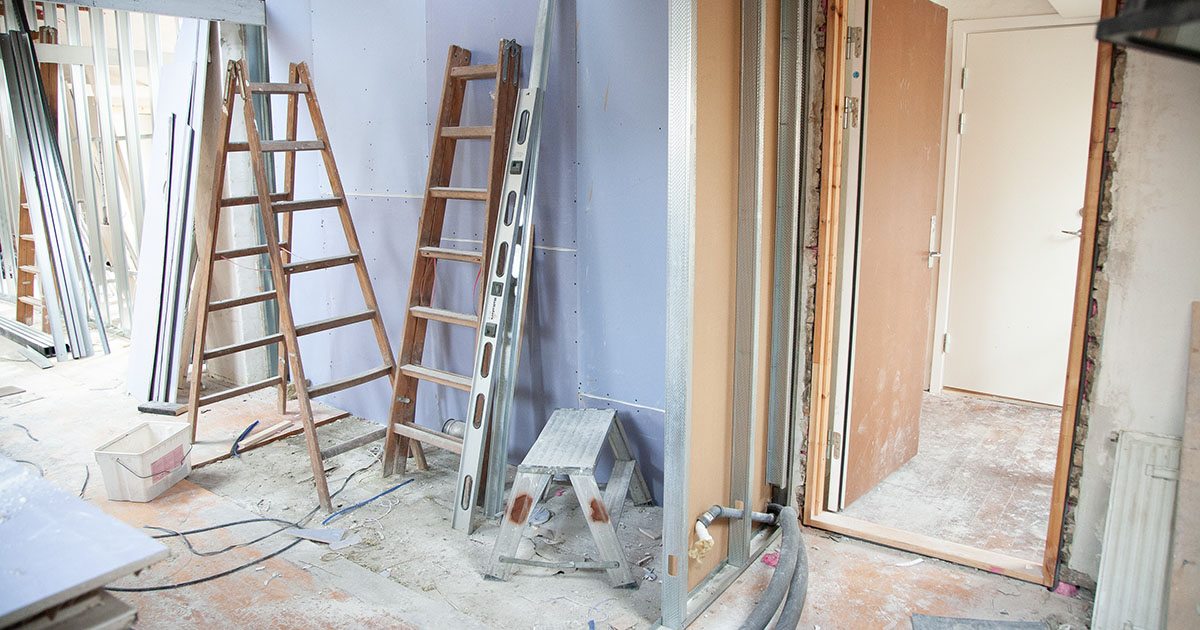10 Things to Know Before You Start a Home Improvement Project
When done properly, home improvement projects can add resale value to your home. In fact, Angie’s List estimates the return on investment for kitchen and bath renovations to be as high as 85 percent. Click below to find out how!
 On the other hand, these projects can bust your budget if you fail to map out supply costs and get multiple quotes from contractors. Get the job done right the first time so you can cash in big later with these 10 tips for starting a home improvement project.
On the other hand, these projects can bust your budget if you fail to map out supply costs and get multiple quotes from contractors. Get the job done right the first time so you can cash in big later with these 10 tips for starting a home improvement project.
1. Before contracting anyone, consider the value-added
No matter what project you plan to start around the house — from the bathroom to the backyard — it’s important to ask two all-important questions: How much will this cost you, and how much value will this add to your home? For those answers, you’ll need to talk to a couple people, mainly a contractor for the former and a realtor for the latter. If your project bumps up your home’s value significantly, it’s probably not a bad idea to dive in, especially if what you plan to upgrade is long overdue. If you’ll only see a small return on investment, however, consider the consequences. There’s nothing wrong with pursuing a vanity project if it’ll make you happy in the long run, but you need to reconcile that with yourself and your wallet before you make any costly decisions. (See also: Architect, Designer, or Contractor: Who Should You Hire for Your Project?)
2. You will most likely be inconvenienced
If you’re planning a major renovation, you’ll likely be inconvenienced by not being able to use those rooms while the project is ongoing, and that’s something you need to think about before starting. Consider not only how you’ll manage without these facilities, but also the time of year and how uncomfortable you may be during construction. (See also: 5 Home Renovations That Could Hurt Your Home's Value)
3. Not all contractors are created equal
You won’t have trouble finding a contractor to bid out your work, but finding the right contractor will take some time.
“In the planning stages, interview multiple contractors,” says Kylee Della Volpe, an editor for Mortgages.com. “Ask them about their costs, communication style, and to provide references. This will help you choose a professional who can help keep the project running smoothly for you.”
It’s not a bad idea to ask your friends and family for recommendations, as well. Before I blindly search online for a contractor, I always consult those in my network whom I trust. Look at past results, too. Ask the contractor for photos and/or videos of recent projects. Those who know what they’re doing and run a solid business will have no problem showing you what they’re capable of. Experience counts here.
The Better Business Bureau also advises that homeowners find out if a contractor is a member of a professional association, which has standards or a code of ethics.
“All BBB Accredited Businesses have agreed to uphold BBB standards for ethics in the marketplace,” says Lisa Schiller, director of investigations and media relations for BBB serving Wisconsin. “Homeowners also should check with BBB to learn how long a contractor has been in business and if the firm has been responsive to any complaints filed with BBB. In addition, BBB reports can tell you how long the company has been in business, show complaint detail, and show posted reviews — positive, negative, and neutral — as well as any known government action.” (See also: How to Find and Hire a Reliable Contractor)
4. Original blueprints of your house will move the process along faster
If you have the original blueprints of your home, plus any plans that include home improvements and additions over the years, offer them to the contractor. You’ll save time and possibly money if he or she doesn’t have to start from scratch.
5. Make sure there’s a contract that covers the scope of work
Before starting any kind of work that’s going to impact your finances, you should have a contract in place. If the contractor is unwilling to provide one or acts shifty when it’s suggested, you should absolutely consider this a red flag. Do not work with anyone who doesn’t want to draw up a contract for your plans.
The contract should include the company's name, address, and phone number, and have start and completion dates, plus estimated cost written into it.
However, if you sign the contract away from the place of business, the Right of Rescission applies — which says you have three legal business days to cancel. If you enact this right, be sure to put the rescission in writing, mail it so that it’s postmarked by the third business day, and make a copy for yourself. Also, keep a copy of the contract and the warranty for your records, as well.
6. Permits will most likely be required for major work
You may need permits for your work. The contractor should provide the costs for all permits in your estimate, and usually the contractor is responsible for pulling the permits from local offices unless you agree otherwise. Home improvements that may require permits include new windows, fences; structural changes, like building a deck; and plumbing and electrical work. Your city council office will have information for improvements and projects that require permits.
7. Get an itemized estimate to help you plan your budget
When a contractor bids out your work, ask for itemized billing opposed to a lump sum fee for the scope of work. The latter doesn't provide you with a transparent view of where you’re money is going, but that’s information you need to know in order to choose the right person for the job, or if the job is even worth it. (See also: 9 Home Improvements You Should Always Negotiate)
“Before you start a project, you should be sure to get estimates on everything, including the permits and any money you spend if you can't use parts of your house, like the kitchen or bedrooms, then do some research to see how much that particular improvement adds to the value of the home,” Della Volpe says. “If it adds more value than it costs, go for it. If it doesn't, it's time to evaluate how much you'll lose in the process and whether that amount is worth it to you in terms of comfort in your home.”
8. Never pay in full or up front
You should solicit at least three bids from prospective contractors based on the exact same specs of the full project, including materials, labor, and time needed to complete.
“Homeowners need to discuss bids in detail with each contractor, making certain they understand the reasons for any variations in the prices and not automatically making a decision based on lowest price,” Schiller says. “Cost differences may include issues such as material quality, craftsmanship, and subcontracting for specialized labor.”
Never pay in full or up front. Any contractor who requires this is most likely scamming you. Only pay the balance once the work is completed and to your satisfaction. One-third down payment should be sufficient to start — if you must put anything down. Then pay one-third when the project is underway, and the balance upon completion. Don't pay in cash, either; BBB suggests paying with a credit card whenever possible.
9. Your contractors must be insured
God forbid something happens to one of your contractors on the job and you’re held liable or just plain S.O.L. You don’t want that headache, which is why their company should be bonded and insured against worker’s comp claims, property damage, and personal liability in case of accidents. Don’t just take the contractor’s word for it, either. Ask for proof or call to verify insurance coverage by asking for the name of the agency and carrier.
10. Don’t bite off more than you can chew if you’re DIYing
If you think you’re handy enough to handle a home improvement project yourself, more power to you. Just be realistic in your capabilities and what you can handle given the scope of work. You don’t want to bite off more than you can chew, which in the long run will not only inconvenience you, but could end up being costlier than if you’d have hired a contractor from the beginning.
This article was originally published on Wisebread.com








